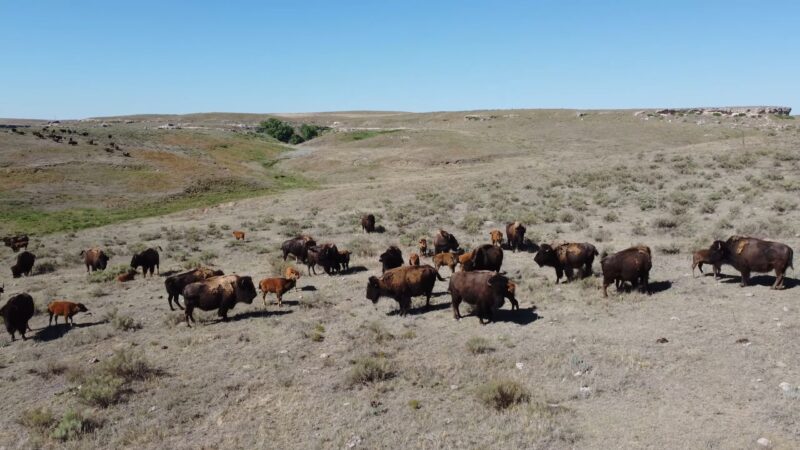Bison, an iconic North American animal, presents a distinct culinary experience with its unique flavor and nutritional benefits.
Today, I will discuss the taste, health aspects, and cooking methods of bison meat, offering valuable insights for both food lovers and those curious about this alternative to conventional meats.
The Flavor Profile

Bison meat is often compared to beef, yet it holds a distinct taste that sets it apart. First and foremost, it’s important to note that this meat is remarkably lean. This leanness contributes to a slightly different texture and taste compared to fattier meats like beef.
Generally, it has a richer and slightly sweeter flavor. This sweetness is subtle, not overpowering, and provides a unique gustatory experience. Unlike some game meats, bison doesn’t carry a gamey or wild taste, making it more approachable for those new to alternative meats.
Cooking Methods and Their Impact on Flavor

The way bison meat is cooked plays a crucial role in its final taste. Due to its low-fat content, it cooks faster than beef and is best enjoyed when not overcooked. Overcooking can lead to a tough and less flavorful experience.
Grilling, broiling, and roasting are excellent methods to prepare bison, each lending a unique aspect to its flavor. Grilling, for example, imparts a smoky note that complements the natural sweetness of the meat, while slow roasting can enhance its tenderness and juiciness.
Pairings and Seasonings

To truly appreciate the flavor of bison, consider the seasonings and pairings. Since bison is naturally flavorful, it requires minimal seasoning. Simple salt and pepper can suffice, but for those looking to experiment, herbs like rosemary and thyme harmonize well with its taste.
In terms of pairings, this meat goes well with robust, earthy side dishes. Root vegetables, mushrooms, and hearty grains like quinoa or farro make excellent companions, enhancing the meat’s natural flavors without overpowering it.
Nutritional Benefits
When it comes to nutritional value, bison stands out among its meat counterparts. It is significantly leaner than beef and contains fewer calories. This makes it an excellent choice for those mindful of fat intake.
Additionally, this meat is rich in essential nutrients such as protein, iron, and B vitamins. These nutritional benefits position bison as a healthier alternative to traditional red meats without sacrificing flavor.
The Role in a Balanced Diet
Incorporating bison into a balanced diet can offer several health advantages. Its high protein content makes it an excellent option for muscle building and maintenance. The iron in bison is crucial for oxygen transport and energy production, making it a great choice for active individuals.
Furthermore, the presence of B vitamins in bison supports various metabolic processes and promotes overall health.
Sustainability and Ethical Considerations

Beyond its nutritional value, choosing bison also has environmental and ethical implications. Bison farming generally requires fewer resources than cattle farming, making it a more sustainable option.
Additionally, many bison producers adhere to ethical and humane practices, ensuring the animals are raised in natural environments with minimal intervention. This aspect not only contributes to the quality of the meat but also aligns with the growing consumer demand for ethically sourced food products.
Cooking and Preparation Tips
To fully appreciate bison’s flavor and texture, proper cooking techniques are essential. Since this meat is leaner than beef, it requires careful attention to avoid overcooking. A good rule of thumb is to cook it at a lower temperature for a slightly shorter duration than beef.
For steaks, medium-rare to medium is often the ideal doneness, preserving the meat’s moisture and tenderness. Using a meat thermometer can help achieve the perfect level of doneness.
Creative Recipes to Try
Exploring different recipes can enhance your experience with bison meat. Burgers are a popular and easy way to start. For a more adventurous culinary journey, consider bison chili, which allows the meat’s rich flavor to meld beautifully with spices.
Stew, slow-cooked with vegetables and herbs, showcases the meat’s ability to absorb and complement a range of flavors, making for a comforting and satisfying meal.
Mistakes to Avoid When Cooking
Given bison’s unique properties, certain common mistakes should be avoided. Over-seasoning can mask the meat’s natural taste, so it’s advisable to use seasonings sparingly.
Additionally, flipping the meat too often during cooking can lead to uneven cooking and loss of juices. Finally, remember to let the bison meat rest after cooking. This allows the juices to be redistributed, ensuring each bite is flavorful and tender.
The Economic and Environmental Impact of Bison Farming
The resurgence of bison not only impacts culinary circles but also has significant ecological and economic implications. Historically, bison were nearly hunted to extinction, but conservation efforts and sustainable farming practices have helped revive their populations.
This revival has economic benefits, particularly for small and local farmers who have embraced bison farming as a more sustainable and profitable alternative to traditional livestock.
Farming and Environmental Sustainability
Bison farming is generally considered more environmentally friendly than traditional cattle farming. These animals are well-adapted to the North American climate and terrain, often requiring less intensive care and resources.
They graze in a way that promotes healthy grasslands, contributing to the maintenance of these ecosystems. This natural harmony between bison and their environment makes their farming a more sustainable option.
The Economic Benefits
The growing popularity of bison meat has also led to economic benefits. As demand increases, it provides a lucrative market for farmers, especially those focusing on ethical and sustainable practices.
This economic incentive encourages more farmers to consider bison farming, potentially leading to a more diverse and sustainable agricultural sector.
FAQs
Can bison meat be used as a direct substitute for beef in recipes?
Yes, it can typically replace beef in most recipes, but remember to adjust cooking times due to its lower fat content.
Is bison meat more expensive than beef?
Generally, it is more expensive than beef, largely due to its lower supply and higher production costs.
Can people with red meat allergies eat bison?
People with allergies to red meat should consult a doctor before trying this meat, as it may trigger similar allergic reactions.
Are there any specific cuts of bison meat that are particularly popular?
Steaks, particularly ribeye and sirloin, are quite popular due to their tenderness and flavor.
How should bison meat be stored for optimum freshness?
It should be stored in the refrigerator or freezer, similar to beef. If refrigerated, use it within a few days; if frozen, it can last several months.
Is bison meat available year-round?
Yes, it is generally available year-round, though availability can vary depending on the region and supplier.
Final Words
Bison meat offers a unique and enjoyable culinary experience. Its distinct taste, coupled with its nutritional benefits and sustainable farming practices, makes it a worthy addition to any diet.
Knowing its flavor profile, cooking techniques, and pairings will let fully appreciate what bison has to offer. Whether you’re a seasoned chef or a curious food enthusiast, experimenting with bison meat can bring new and exciting flavors to your table.
If you’re a big fan of bison, Medora campgrounds are their home and their numbers range from 100 to 500.






